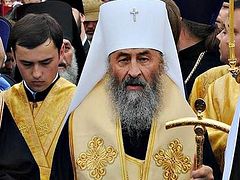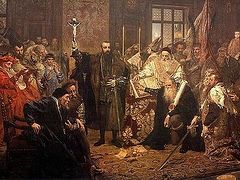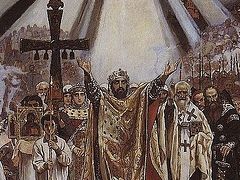This interview with the greatly loved Metropolitan of Ternopil was published in 2014, the year of the Maidan revolution in Ukraine.
Ternopil is one of the most difficult dioceses for Orthodox Christians who have not joined the schismatic “Kiev Patriarchate”. The region has also been dominated by Uniates. Therefore Metr. Sergius and his flock could well be called a diocese of confessors of the faith.
* * *
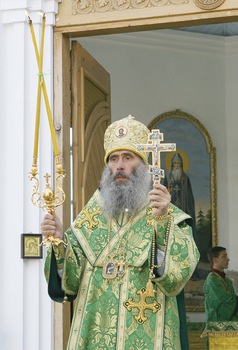
—That’s right. My dad, father Naum, was a country priest. There were four of us in the family: three daughters and me. We lived in difficult times with the faith being the very core of our lives. And people would keep their deep faith alive despite great oppression under the Soviet regime. During Pascha and Bright Week, our large wooden church would be full of people. I remember how the procession of the Cross would come out to the large courtyard after the service, and people would group into circles to have their paskhas blessed. This was kind of a cheesecake, called paskha. It was a simple pastry with sweet cheese baked in the center. Of course, we had painted eggs, and I’ve never seen anything like that since those days. I remember before the sunrise: Plenty of candles were burning; twig baskets and national embroidered towels... Everybody had a warm feeling that Pascha was approaching. People would dress in their best national clothes. I haven’t seen such pearl rose embroidery on the girls’ blouses anywhere else. Men’s shirts were also embroidered but with a less sophisticated design. After the meal, people would come to the churchyard again, greet each other, and celebrate the Feast of Feasts. Nobody was afraid of the authorities. The bell tower was not closed; everybody could ring the bells. You know, we grew up in devoutness without particularly thinking about it, doing nothing special.
—Vladyka, you said that you were not afraid of the authorities. Did the officers try to influence politically unreliable citizens?
—Of course, they did. All the churchgoers were monitored. However, the authorities just performed their duties, they were not too cruel. We felt it. At school, they knew me as a son of a priest, but nobody reproached me—neither the teachers nor the principal, nor the officers. They even respected me.
—Do you remember your first vivid impression of God’s presence?
—I can’t remember anything somehow vivid. My life was simple. That’s the way it was in the old days. We prayed at home. We knew how important it was to keep the fasts and celebrate the feasts, to have the fear of God in relationships, not to lose heart, to accept all the circumstances we live in as God’s Providence.
—Did you ever see people being martyred for their faith or being taken to concentration camps?
—No, it wasn’t the same for us as in Soviet Russia. We heard that somebody had been arrested and imprisoned, but no more. Only echoes came to the Chernivtsi province in Western Ukraine. Although we did have repressions in Ukraine—the authorities closed churches, forbade people to attend services and receive the Sacraments. They punished churchgoers with unfair dismissal from work, college expulsion, or other administrative measures. But the people upheld their faith and lived an ecclesiastical life. The overwhelming majority of citizens followed the Church year in their everyday lives. The Sacrament of Baptism was performed either openly or secretly, as well as weddings, burials, blessing of homes and other rites.
—Vladyka, you graduated from a medical college before seminary, but your fate was decided in another way. Why?
—My parents told me to go to the medical college, and I followed their advice. Learning came easy to me and it was somehow interesting. I even intended to continue my medical practice. But I couldn’t ignore the circumstances of my time. Once, still studying at the medical college, I went to the local cathedral to listen to the choir and saw a hierarchical service. I’ve never seen anything like that in my entire life! In those days, the diocese of Chernivtsi was headed by Bishop Theodosius (now a metropolitan in retirement), who gave tremendous sermons. I was truly amazed. Little by little, I began to help in the altar and joined the church choir. This didn’t go unnoticed, and I was deprived by the college administration of all the rewards due me for graduating with honors. Then I was drafted into the army, to the North, to the construction battalion. So my parents prayed, blessed me with their wedding icons, had a moleben served with an Akathist to St. Nicholas, and ... the call-up commission did not take me into the army. They examined me and found a heart disease. Later I served in the army in my native town of Chernivtsi, in more favorable conditions. My service in the army was like God’s mercy, and my heart didn’t bother me. The year before the next call I was working in a rural hospital as a nurse practitioner. They respected me, and then I realized that the people had looked at me not just as a medical specialist, but as a priest’s son, an Orthodox believer. At that time I realized that inner nobility is what really mattered; you have to be a Christian wherever you are. That’s the main lesson I learned from my medical practice. By that time had I decided to join the seminary. The ecclesiastical life attracted me more and more. I would go to services, go to the cathedral on holidays, and get acquainted with Church people.
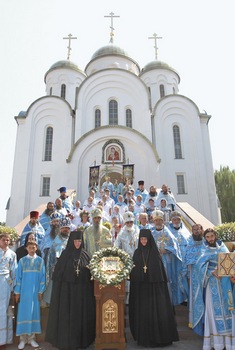
—While I was in the army, Vladyka Theodosius was transfered to Smolensk. I needed a letter of recommendation from the bishop to join the seminary. There was a strict rule: The bishop who blessed the student and gave the letter of recommendation was in charge of him. The bishop who was appointed instead of Vladyka Theodosius didn’t know me at all, so I went to Smolensk. I went to see Vladyka, we had a conversation, and he promised to give me a letter of recommendation. Suddenly, the senior deacon in Smolensk died, and Vladyka told me: “Go to the Hodegetria icon of the Mother of God,[1] pray to Her and stay here. You’ll be a deacon.” So I stayed for twelve years.
—Did you miss your homeland, Ukraine?
—Yes, I did, but only in the beginning. Later I had many obligations, celebrated services, and—what was the most important—I lived in the churchyard. Here was the diocesan administration; there was the church, and my room next to it. I didn’t feel like I was in a foreign land. Besides, I felt that I was following God’s will, not mine—so why should I despair? We young clergy lived like a close-knit community, served zealously, and were loved and warmly treated by the laity. I still gratefully remember the citizens of Smolensk. We visit each other on the feast of the Hodegetria icon of the Mother of God, and on our patronal feast of the Holy Martyrs Vera (Faith), Nadezhda (Hope), Liubov (Love) and Sofia (Wisdom).
—But later you did receive a theological education in the Moscow seminary. What do you remember about your seminary years?
—Unfortunately, I studied part-time. I received my first impression of the Holy Trinity Lavra-St. Sergius Lavra in 1970, when Bishop Theodosius took me to Sergiev Posad after my graduation from the medical college. We stayed there for twenty-four hours, went to confession, and took Communion. The Lavra had a great influence on me then. I looked at the ancient churches from the window of the pilgrimage house, heard the ringing of bells from the tower, and felt a wonderful warm feeling come over me...
And in three years, as a deacon, I entered the department of distance learning of the Moscow Theological Seminary. While in Moscow during my studies, I wanted my exams to last longer just to stay in the Lavra for at least one more day. There, for the first time I got so close to the monastic life and felt strongly that it was so close to me. I even didn’t want to leave.
But the special blessing came when I was taken to Archimandrite Kirill (Pavlov), the father confessor of the Lavra’s brotherhood. It was a great mercy of God that through Father Kirill, who emboadied mercy, love, and paternal care, supported me then, strengthened me, and gave me spiritual experience and joyful communion with brotherhood of the great Lavra.
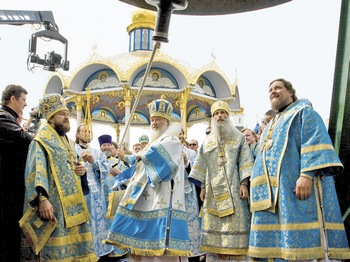
—But you didn’t stay in Moscow and asked to join the Pochaev Monastery…
—My native village is about five miles from the Holy Dormition Pochaev Lavra. The landscape is mountainous there, and the Lavra is located on a hill. At sunset it seems to be floating above the earth like the Heavenly Jerusalem. When I would go to the Lavra with my parents, I would look at the monks as if they were angels. And I felt it was beyond my abilities to join them. In the Holy Trinity-St. Sergius Lavra I had real interaction with monks—they are truly different people. My dream was to be among them, as the lowest monk. But I didn’t even dream about Pochaev Lavra—that seemed too ambitious for me. Perhaps I had that feeling since my childhood. And then, suddenly, after twelve years of service in Smolensk, I wanted to go to Pochaev. In those days it was very hard to join the monastery, but I had such a strong desire that I even tried to arrange things behind Vladyka Theodosius’s back. I almost got on his bad side. Everything was arranged only when I completely came to terms with my circumstances and left things to God’s will and the will of Mother of God. I received my invitation to join the Lavra during Bright week—just think of it! On Victory day, May 9, 1985, through the blessing of Archbishop Kirill (now His Holiness the Patriarch), I left my dear Smolensk cathedral, and moved to Pochaev.
—Tell us about this period of your life. Did you take your monastic vows there?
—Yes, I took my monastic vows in Pochaev. The tonsure service was celebrated by the abbot of the Lavra, Archimandrite Mark (now Archbishop of Khust). He gave me a new name that I couldn’t even have dreamed of, so it was joyful and terrifying at the same time. At first, I even hesitated to be called Sergius, in honor of such a great saint, Sergius of Radonezh. And, you know, only in Pochaev did I start to truly perceive the life of Church. I used to serve in the altar one week and then serve my obedience in the church choir the other three weeks. And through reading those daily services from A to Z, I discovered the depth of the Church service cycle, which consecrates everyday life and the monastic life. Observing all the Church rules is the most important thing in the Church and in society as a whole. I truly perceived it only in the Lavra.
—You were appointed to the Ternopil Diocese after six years, straight from the Pochaev Monastery. How did you manage with that?
—I was appointed for a certain disobedience. It was already the beginning of the Ukrainian schism. Archbishop Lazarus of Ternopil was the Holy Archimandrite of the Pochaev Lavra. When the crisis arose, he was first pushed out of the cathedral church, then from the last church of the Moscow Patriarchate. He had one house church left, with one priest and one deacon. The brothers of the Lavra used to go to Ternopil from time to time and celebrate the services in that house. I didn’t want to go there at all, so I prayed to the Mother of God not to be sent to do my week’s service. And it came true—they didn’t send me there for a week, they sent me there for the rest of my life. I arrived at the Ternopil Cathedral on the first day of Great Lent. At the first service—the penitential Canon of St. Andrew of Crete—I was met by a handful of parishioners. And when I saw those people crowded in our prayer house—no one moving, no extraneous noise—I felt light-hearted. Day after day, month after month, I learned how to pray in such circumstances, how to live an ecclesiastical life. That was almost the most important lesson in my life. One more lesson was how the people stood firm in their Orthodox faith. I felt it here, in Ternopil, in that house, by virtue of the brotherhood’s prayer. We performed all the services in full, without shortening anything. People lived by that strong prayer. Nobody felt burdened, nobody hurried to go home—everybody would pray. And little by little the clergy gathered as well as the choir, and our spiritual unity was established. And people said, “Only now have we begun to understand what Orthodoxy really is.”
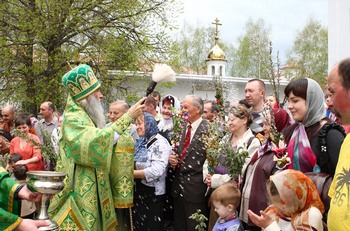
—Vladyka, what is the reason for the Church schism in Ukraine?
—I think there are several reasons. The main reason is the collapse of the government that occurred at that time, the total absence of authority, the spirit of nationalism and the aversion to Soviet regime. There was an atrophy of ecclesiastical life, and acquiescence to the traditions of Uniates who were strong in Western Ukraine. For example, priests somehow cut prayers from the services, hurried through them here and there. So the appearance of the services was maintained while the essence of prayer disappeared: They served not God, but people. They tried to keep people in the Church by those measures. But the tradeoff didn’t work. Because when people see that the clergy have lost reverence, they drop out. People search for those priests who try to do the services by the rule, and with the fear of God. People feel these things very clearly. One of the main reasons was the powerful government support for the schism. The tragedy of this event is still painful. Now in Ternopil we have seventy churches of various confessions, and only one church of the Moscow Patriarchate. We have asked for more churches, but there are no more given to us. In fact, we are foreigners in our own homeland, in our own country. Still we thank God for what we have. In Soviet times we also had only one church, but that is not main thing—the true liturgical life is most important. And our Lord always shows us that He is with us. We feel pity for people who are under delusion. They are zealous, live an ecclesiastical life, and go to church with all their families. And I think that if the situation changes and the political environment becomes more favorable, if the authorities would have an at least neutral attitude toward the Orthodox of the Moscow Patriarchate, well… People here have been Orthodox for ages.
—It is known that when Philaret (Denisenko) was still the Metropolitan of the Ukrainian Orthodox Church, he tried to remove you from the diocese but the people wouldn’t let you go and so you stayed there. This was perhaps not totally lawful, since you disobeyed the head of Church; but Philaret acted in such a way that priests in some parishes refused to pray for him at the Liturgy. How did you resolve to do that? Did you have any hesitations in this matter?
—You know, I was ready to accept the decision of the head of the Church. I had a meeting with the clergy, said goodbye to all of them, and set the day for my departure to Kiev. Meanwhile, people went to Metropolitan Philaret to advocate for me. But they came back empty-handed, and said to me, “Vladyka, we parishioners won’t let you go, we’ll lock the house and the yard and we’ll be on duty.” On the instructions of Philaret, bishops came to me, but the people were scared for me and didn’t let them see me. So I stayed in the diocese not by my own will. I see this as God’s mercy, and that’s why my conscience is at peace. And people proved their rightness. They were not protecting me personally, but protecting the Church. I saw the people’s strength and their sincere faith. I didn’t expect this. His Holiness [the Patriarch] called a Council of Bishops at which it was proved that Metropolitan Philaret had overstepped the limits of his authority. Then another decree had to be issued appointing all the fired bishops back to their dioceses.
—People protected the archbishop… Was it because of some national traits? I think that we in Russia don’t believe in justice, in the possibility of defending anything by our own efforts...
—Church history knows many cases when people have managed to protect someone or other. However I don’t think that our parishioners followed a historical tradition, they just followed their hearts. In post-revolutionary Russia, in the period of renovationism, people protected their priests and traditional Orthodox values! But in Russia, the Bolshevik moloch swept away everything in its path, while here, in Western Ukraine, people kept their faith alive. And of course these are southerners, with a different temperament.
—If we look at historical events, we get the feeling that those who advocated schism were not at all acting according to any theological errors. If so, they might have had some justification. Laypeople, clergy, bishops—were they the people of faith? If so, why did it happen? Why did they start to behave like they didn’t have Christ in their souls at all, and didn’t know anything about Him?
—This is a tough question. Take the example of former Metropolitan Philaret (Denisenko). I used to serve together with him. He was a man of unattainable grandeur; we respected and honored him. When I became a bishop, I became better acquainted with him; from time to time he gathered us in Kiev and actually taught and strengthened us in the faith. We listened to him with great delight. And when a campaign against him started I told my parishioners: “Don’t believe it. I don’t.” I could hardly ever imagine something like this. And now, when such awful events have happened, I see this as a great lesson for all of us: What a pillar of faith he was and yet he wasn’t able to stand. See how dangerous is to trust yourself, to not humble yourself, to get proud. We don’t stay in the Church by ourselves; the Lord keeps us in the Church. Those people were not like that, but what happened to them!? It’s a darkening of the mind, sinful prelest (spiritual delusion), the devil’s mockery. At first we were indignant, but now just have compassion and pray. We have a special prayer for them, and serve molebens weekly. We are afraid of judging them because we see how people got into a mess under the devil’s influence. We know how difficult is to come back and to repent of our errors. After all, the mark of schism, the mark of apostasy—this is a terrible mark. What is most important is to keep our faith and to never, ever become proud.
But it is also wrong to be complacent, to be too tolerant. We do not disdain people, we do not humiliate them or offend them, but call a spade a spade: they are schismatics. This is showing love, because we tell them: “Stop, there is an precipice there!” But if we tell them: “Well, you know, there is a certain geographical area, and a little further away there may be a certain landscape...” Forgive me, but while I’m lecturing the person will be lost. We have to follow God’s truth, while a tradeoff is of no help. The tradeoff has already revealed itself. We pray and hope for the Lord’s mercy.
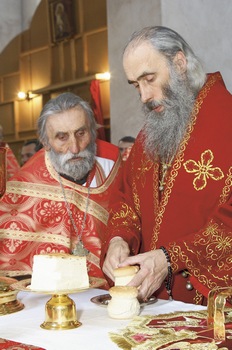
—Yes, but only through repentance. Those parishes have sincere people among them, who are simply lost like the apostle Paul on his way to Damascus (cf. Acts. 9:3–9). The mass media intrudes and forms the information landscape. Certainly some people don’t want to plumb the depths, and live a superficial life. However, on the whole, the people here are pious, devoted, and zealous. We hope that the Lord will someday reveal the truth to them and they will understand that they are already next to Him; just one more step—the most important one—is left. And one more important issue is our own behavior and devotion, so that other people would see vividly how the Orthodox live. We have to bear witness to purity, to Orthodoxy, to the grace of God, which is with us throughout our lives. And such a personal example will be the most helpful.
—Vladyka, I have to ask you about the events that have started recently,[2] also known as Euromaidan...
—Unfortunately, we have the same within our region. It is clear that this is a provocation from outside, but our citizens are quite fascinated and can’t see the situation as it is and they forget themselves. It is terrible to see how the devil has tempted people so that they have forgotten everything sacred, both divine and human. They forgot that they are made in the image of God; they were aggressive and full of hate even during the days of the Nativity Fast, when we prepare ourselves to meet Christ the Savior. And He is the one Who decides our fate, and the decision depends on our unity with Him…
—Do you experience aggression against the diocese?
—Yes, we do. These clamorous protesters directly call out against the Moscow Patriarchate. But, clearly, it is sent for us to brace up, to pray heartily, to strengthen our faith and devotion to God. At each service we utter our prayers for peace and reconciliation of the parties. We hope for God’s mercy.
—Vladyka, what issues of ecclesiastical life are the most relevant now? Are the issues of frequent Communion, the necessity of confession before it, the issues of the translation of the services from Old Church Slavonic to modern Ukrainian discussed at conferences or forums or even just among the parishioners?
—No, they aren’t, because people live a truly religious life. I just want to emphasize it once more. They confess, take Communion and do not follow any new ideas. They try to observe their preparation days before Communion properly—at least several days of strict fasting and more frequent attendance of services. Taking Communion without confession is simply out of the question. They don’t even go to confession if they haven’t heard the special prayers before it. People often confess without taking Communion.
Only a few parishes in our diocese partly perform services in Ukrainian, but mostly in Old Church Slavonic. Actually, taking Communion without due preparation, avoidance of confession, a change of the rules or any reformation of the services is deemed to be a favoring of Catholicism or schism.
You well noticed that it has been discussed on forums. But the Church lives, churchgoers try to keep themselves in piety after receiving Communion, and try not to lose this grace after the Liturgy. In Soviet times people would rarely take Communion, but they kept the grace of Communion for a long time. They lived a truly, authentic religious life, not on web pages or in mass media. Unfortunately, some “new” theological opinions and strange publications appear and confuse people. Debate arises, but according to the saying, discussion isn’t the best way to bring out the truth. These things come from the outside and are being introduced artificially. That’s why I suppose we don’t have to confuse those religious people who have kept their faith alive and preserved it for us until the present.
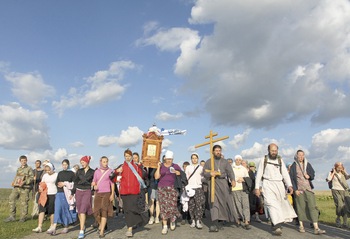
—Do you speak about it from the ambo?
—Yes, we do. We explain to our clergy and laymen how important it is to follow the Church’s rules; we warn them about new ideas that weaken faith and godliness, take away grace, and result in schism.
Glory be to God, we have the Pochaev Lavra near us, so we feel this protection over us. The Lavra’s spiritual authority is indisputable. My voice won’t be heard, while the Lavra’s voice will be heard. You know, our life is quite vibrant. The number of young parishioners in our diocese is growing. We have 170 young men in our seminary, and 120 girls studying in the Church music department. And how many children attend our Sunday-school, and how good are they! What is most important, nobody forbids us to pray, and nobody closes the doors of our temples. So we have to strengthen ourselves and assert ourselves in ecclesiastical life. The Church will bless everything: our everyday life, the world, the government, our enemies—everybody. And, God be thanked, people try to live this way. May God grant that people will stand in their Orthodox faith and live according to it, remembering the commandment of Christ: But seek first the kingdom of God and His righteousness, and all these things shall be added to you. (Matt. 6:33).
Photographs provided by the Ternopil Diocese.

